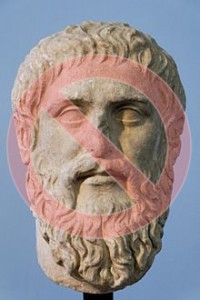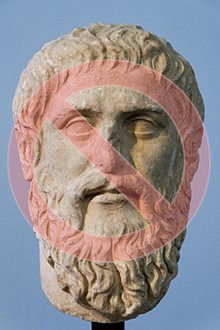A Video Helpful For Highlighting Differences Between Epicureanism and Stoicism
 May Plato’s God of Reason forgive me for posting this link, but if asked I will respond that his God fated me to do it! I recently came across the short five minute video on Stoicism linked below. Of course Stoicism is not the same as Platonism, and it is difficult to define philosophies which have multiple figures and lack the kind of orderly list of “Principal Doctrines” that Epicureans developed. Nevertheless, it is important to know the history of where we are and how we got here, and this short video packs in a lot of helpful information.
May Plato’s God of Reason forgive me for posting this link, but if asked I will respond that his God fated me to do it! I recently came across the short five minute video on Stoicism linked below. Of course Stoicism is not the same as Platonism, and it is difficult to define philosophies which have multiple figures and lack the kind of orderly list of “Principal Doctrines” that Epicureans developed. Nevertheless, it is important to know the history of where we are and how we got here, and this short video packs in a lot of helpful information.(2) What men do best is “think” – (ah the blessings of pure reason unencumbered from the body!)
(3) Our lives have significance because we should think of ourselves as part of the “great arc of time.”
(4) Stoicism is a philosophy not for ordinary people, but to a philosophy to make us “saints.”
(5) There is a god of reason behind the creation and operation of the universe, and that god drives everything, and indeed has FATED us to do all that we do and be all that we are.
(6) “To a Stoic, pain and pleasure are the same. If we train our minds to use reason we can learn to be free from pain and pleasure.”
(7) “There has got to be something else (more than pleasure) worth living for!”
(8) Whether things in our lives hurt or not, or whether they are pleasurable or not, REALLY DOESN’T MATTER because in the end we are all “part of the same flow.”A few times you hear echoes of familiar Epicurean thoughts, but if you think about it, those periodic echoes really don’t make sense if these fundamental principles of Stoicism are really true.
In contrast to the eight points set out at the beginning of this post, Epicurus held the following (this list was prepared by a friend on Facebook who I am glad to credit but I think would prefer that I not!):
(1) Feelings are an important and natural way animals relate to their environment
(2) Human thinking leads men to all sorts of different conclusions, some very absurd. The senses are a more immediate way of understanding.
(3) Our lives have significance because we give it significance.
(4) Philosophy is for everyone, and you can happily be a common person and benefit from philosophy
(5) There are no gods (*that take an interest in our lives), no fate, and we are not deterministically bound.
(6) Pleasure is better than pain.
(7) There is no big or grand scheme or goal we must live for, and if we measure our life by some grand scheme we think up, we will fall short.
(8) What is painful to humans is the only natural evil—some men try to think it away, some men try to think it is personified—but it is just your physical animal body telling you what you need and what will harm you.
And here is the same list of eight points with responses based on cites to the ancient Epicurean texts:
(1) You don’t have to feel things, you can REPRESS them! Epicurus flatly contradicts this: “[The Wise Man” will be **more** susceptible of emotion than other men: that will be no hindrance to his wisdom. [Book X of Diogenes Laertius] Actually all of what is below is a “flat contradiction” so I won’t bother to describe the rest of these with those words.
(2) What men do best is “think” – (ah the blessings of pure reason unencumbered from the body!) This one you have to read to follow, but the bottom line is that Epicurus dethroned reason as the most important faculty, and emphasized that true wisdom is grounded in the senses: Diogenes Laertius: “Nor is there anything which can refute sensations or convict them of error: one sensation cannot convict another and kindred sensation, for they are equally valid; nor can one sensation refute another which is not kindred but heterogeneous, for the objects which the two senses judge are not the same; ***nor again can reason refute them, for reason is wholly dependent on sensation*** ALSO: “PD22. We must consider both the ultimate end and all clear sensory evidence, to which we refer our opinions; for otherwise everything will be full of uncertainty and confusion. 23. If you fight against all your sensations, you will have no standard to which to refer, and thus no means of judging even those sensations which you claim are false.”
(3) Our lives have significance because we should think of ourselves as part of the “great arc of time.” “PD2: 2. Death is nothing to us; for that which has been dissolved into its elements experiences no sensations, and that which has no sensation is nothing to us.” Also 42. “The same time produces both the beginning of the greatest good and the dissolution of the evil.” (Which I believe properly interpreted means all that we have to us occurs starting at birth and ending at death.) And MANY similar quotations about enjoying life now because there is no point in looking to a pre-existence or post-existence.
(4) Stoicism is a philosophy not for ordinary people, but to a philosophy to make us “saints.” Where to begin here? Philosophy is for everyone, and the goal is happy living, not being “saints” How about: “U221 Porphyry, Letter to Marcella, 31, [p. 209, 23 Nauck]: Vain is the word of a philosopher which does not heal any suffering of man. For just as there is no profit in medicine if it does not expel the diseases of the body, so there is no profit in philosophy either, if it does not expel the suffering of the mind.” and many others telling us to take the doctrine of happiness to everyone: “VS52. Friendship dances around the world bidding us all to awaken to the recognition of happiness.”
(5) There is a god of the universe which is reason, which drives everything, and indeed has FATED us to do all that we do and be all that we are. Letter to Menoceus: ” Fate, which some introduce as sovereign over all things, he scorns, affirming rather that some things happen of necessity, others by chance, others through our own agency. For he sees that necessity destroys responsibility and that chance is inconstant; whereas our own actions are autonomous, and it is to them that praise and blame naturally attach. It were better, indeed, to accept the legends of the gods than to bow beneath that yoke of destiny which the natural philosophers have imposed. The one holds out some faint hope that we may escape if we honor the gods, while the necessity of the naturalists is deaf to all entreaties. “
(6) “To a Stoic, pain and pleasure are the same. If we train our minds to use reason we can learn to be free from pain and pleasure.” Too many to list, here, but pain and pleasure are opposites and opposite signals from Nature, the one generally to e embraced and the other generally to be shunned, except when needed to bring about greater pleasure. Just an example of the opposite nature: “PD3. The magnitude of pleasure reaches its limit in the removal of all pain. When such pleasure is present, so long as it is uninterrupted, there is no pain either of body or of mind or of both together.”
(7) “There has got to be something else (more than pleasure) worth living for!” We have already in PD1 disposed of the idea that the gods want us to live in a particular way, so the best way to attack the rest of this is to point out that “virtue” and “the good” are deceptive concepts. Here’s Cicero (writing for an Epicurean: “Those who place the Chief Good in virtue alone are beguiled by the glamour of a name, and do not understand the true demands of nature. If they will consent to listen to Epicurus, they will be delivered from the grossest error. Your school dilates on the transcendent beauty of the virtues; but were they not productive of pleasure, who would deem them either praiseworthy or desirable? We esteem the art of medicine not for its interest as a science, but for its conduciveness to health; the art of navigation is commended for its practical and not its scientific value, because it conveys the rules for sailing a ship with success. So also Wisdom, which must be considered as the art of living, if it effected no result would not be desired; but as it is, it is desired, because it is the artificer that procures and produces pleasure. (The meaning that I attach to pleasure must by this time be clear to you, and you must not be biased against my argument owing to the discreditable associations of the term.)
(8) Whether things in our lives hurt or not, or whether they are pleasurable or not, REALLY DOESN’T MATTER because in the end we are all “part of the same flow.” This one is also the subject of MUCH of the texts. Maybe this one cite from an unusual angle will help: “PD10. If the things that produce the pleasures of profligate men really freed them from fears of the mind concerning celestial and atmospheric phenomena, the fear of death, and the fear of pain; if, further, they taught them to limit their desires, we should never have any fault to find with such persons, for they would then be filled with pleasures from every source and would never have pain of body or mind, which is what is bad.” In other words, pleasure is ultimately Nature’s clearest signal to us as to how to live our lives. We do not follow it blindly in all situations, but UNLESS WE HAD PLEASURE by which to gauge whether our actions result in happiness or pain, we would have NO OTHER reliable guide. “REASON” cannot prove anything absent evidence grounded in the Senses (the three legs of the canon being 5senses/pain-pleasure/anticipations). So, far from “not mattering”, Pleasure is “DIVINE PLEASURE, GUIDE OF LIFE” in Lucretius’ words.

